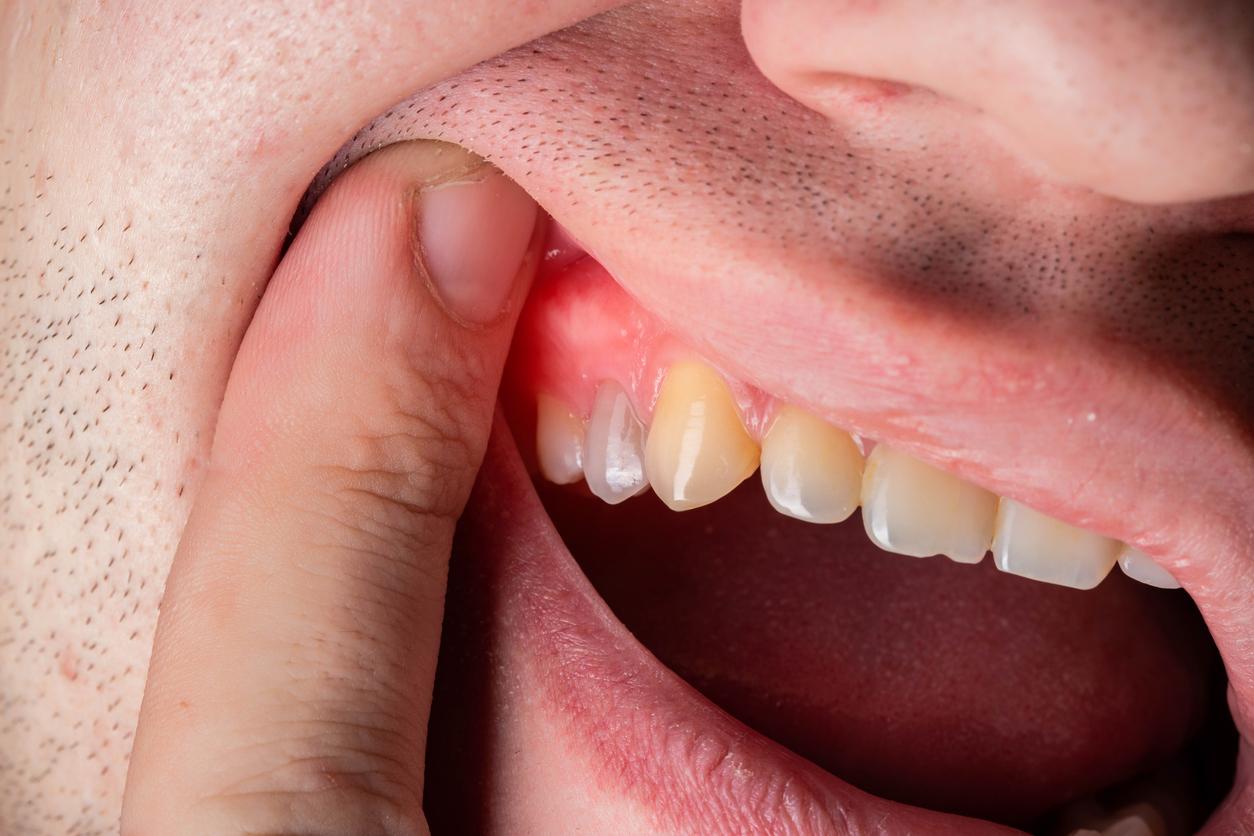
More than half of all over 50s suffer from gum disease (periodontitis). Most don’t notice. Yet it is important to tackle this inflammation, because it can even cause heart problems.
1. What is periodontitis?Gingivitis that has spread to the underlying tissue and bone. During the day, food particles, saliva and bacteria accumulate in the mouth. This mixture, called plaque, sticks to teeth. brush If you don’t do well, plaque turns into tartar. Bacteria easily attach to it and form waste products that irritate the gums. It swells, turns red and bleeds when you touch it.
Without intervention, the problems can get out of hand. The bacteria make small gaps between the teeth and the gums. Even more accumulate in those so-called ‘pockets’ plaque and tartar and the infection spreads deeper and deeper. Ultimately, the bacteria attack the supporting tissue and jawbone, which hold the teeth in place.
2. What are the consequences?The main risk is the loss of teeth. People between the ages of 50 and 54 with periodontal disease have lost an average of six teeth as a result of the condition. Between 65 and 69 that number is eight, between 85 and 90 eleven.
Another thing is that periodontitis can also cause problems in other parts of the body. For example, researchers have discovered that there is a link between gingivitis and heart and vascular disease. It is suspected that bacteria from the oral cavity spread through the bloodstream, causing inflammation in the arteries, possibly resulting in blockages.
Periodontitis could also increase the risk of other inflammatory symptoms, such as rheumatism and pneumonia. Scientists are doing a lot of research on this, so hopefully more will be known in the future.
3. Is periodontitis a complaint of old age?The oral disease occurs at all ages; two in a thousand children suffer from it. But the number of people with periodontitis does increase with age. For example, between the ages of 30 and 34, 22 percent of people have periodontal disease. Between 50 and 54, that percentage has already risen to 40 percent. 54 percent of people between the ages of 65 and 69 suffer from it. So it is a widespread problem.
The fact that periodontitis is more common in the over 50s is because today we keep our own teeth until old age. In 1981 one in three Dutch people had dentures, in 2004 that was only one in seven. Furthermore, the elderly can become less adept at cleaning their teeth or develop other health problems that reduce their immune system. In both cases, bacteria are more likely to strike.
4. When should you ring the bell?The insidious thing is that you usually don’t notice much of the destructive bacteria in the mouth. More than 90 percent of people with periodontal disease have no pain and are unaware of the problem. In any case, be alert to these signs: red and/or bleeding gums, a bad breath, more space between the front teeth or loose teeth.
If teeth are really loose, you are actually too late. Once broken down support tissue and jaw bone no longer grow. Many people over 50 think that wobbly teeth are part of natural aging, but that is certainly not the case. People who suffer from cardiovascular disease or diabetes are advised to have their teeth checked for periodontal disease, as they are more likely to develop it. And if you have problems with the heart valves and you have to have an operation in the mouth, report this to the practitioner. He may administer an antibiotic to prevent the bacteria from the mouth from entering the bloodstream and thus aggravating existing heart problems.
5. When do you run extra risk?To smoke is the second most important risk factor in the development of periodontitis after plaque. Nicotine causes, among other things, the narrowing of the blood vessels in the gums, so that the blood cells that fight inflammation can reach the affected area less well. In addition, inflamed gums often bleed less in smokers, so that periodontitis goes undetected for longer. (For the same reason, quitters often suffer from bleeding gums.)
Irregular teeth give bacteria more chance to settle in inaccessible places. Diseases that reduce the immune system, such as diabetes and leukemia, make it easier for bacteria to enter through the mouth. The same applies to drugs that suppress the immune system, for example chemotherapy or drugs that are given after a transplant. Serious or chronic stress can also cause a reduced resistance.
Normally you swallow a lot of harmful bacteria. But some drugs, such as antidepressants, sleeping pills and medication to lower blood pressure may decrease saliva production. You will then have a dry mouth. This also increases the risk of periodontitis.
6. Is periodontitis contagious?Bacteria can be transferred between people. But that does not mean that every transferred bacteria also causes periodontitis. The defense of the ‘recipient’ is in many cases perfectly capable of repelling the attack. To be on the safe side, it is wise never to use someone else’s toothbrush.
Thanks to Paul Sipos, dental periodontist and chairman of the Dutch Association for Periodontology (NVvP).
Sources):
- Plus Magazine















